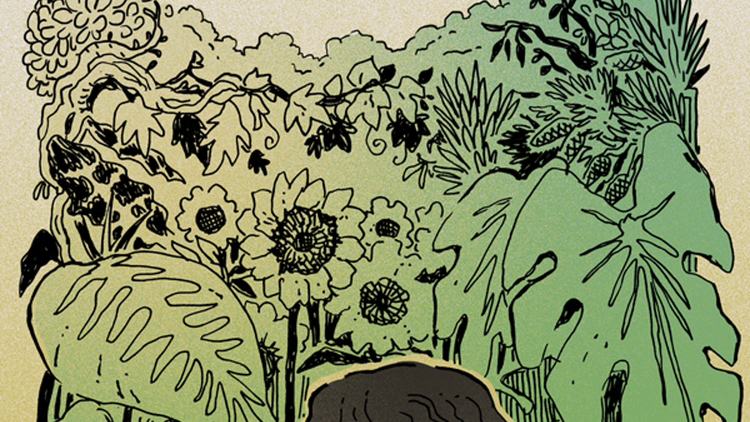Personal Canons: Ender's Game
In addition to my own reflections and guest posts from brilliant folks in the writing community, the Personal Canons series will also feature essays purchased from among the many dazzling submissions I received in response to my open call. Last time, Filip Hajdar Drnovšek Zorko wrote about Dinotopia. Today, I’m thrilled to feature Ty Schalter.
Ty is a professional writer and talker from Lansing, MI. His words have been regularly featured at FiveThirtyEight, VICE, SiriusXM and elsewhere. Though he's best known for his sports opinions, he's a huge nerd and a lifelong genre fiction fan. He's probably on Twitter when he should be updating his website.

"The 24-Hour Church of Elvis" was silkscreened in poison green on the black T-shirt of the kid sitting next to me. It was the first day of eighth grade. On the fourth day of eighth grade, he pressed a battered paperback copy of Ender’s Game into my hands.
"I think you'll appreciate this," he said.
It had a rocketship and a space station and "Hugo Winner" and "Nebula Winner" emblazoned on the cover, as well as "Author's Definitive Edition" which I later learned meant they took out all the n-words.
It was the first time someone my age lent me a book I'd never heard of based on what they'd presumed to be my tastes. My new best friend nailed it: every word, every page, every chapter felt like a special, personal secret. The stories of gifted and talented kids bullied at school, misunderstood, fighting to change the world at home, on the Internet, in space. All the adventure and agency and derring-do I'd felt had been denied to little boys like me.
Then, in ninth grade, we spent an entire term of English class on it.
My special secret, much like E.B. White's comedic frog, was dissected one or two chapters at a time. There was mandatory reading and quizzes and papers and tests. At first, I moaned that the normal kids around me just Didn't Get It—but unlike comedy, Ender’s Game didn't croak under an analytical knife. It sprang to life.
I realized Ender’s Game is a meditation on empathy, a plea for humans to recognize the humanity in everything. A promise that if so much as an egg remains of any of us, there can be a tomorrow for all of us.
"Kill The Canon!" comes the call from around the Internet, and with good reason. The beloved authors and honored greats of genre fiction have spent most of the existence of the Internet proving they're all too human, all too flawed, every bit as self-interested and defensive and reactionary as the old dead literary zombies they beheaded.
This might be more true for Orson Scott Card, the author of Ender’s Game, than any other. He worked tirelessly to build an interactive online community around himself and his work, years before it became common (let alone obligatory). He blogged, he forumed, he started his own short-fiction market, he reviewed everything.
But apparently, all of that work was just to ensure he had the largest possible audience for his slow curdling from the cream-of-the-crop to the garbage disposal.
Never able to reconcile his keen perception of humanity with his narrowly self-imposed worldview, Card's fiction and non-fiction and blogging all merged into reflexive and defensive and illogical mirrors of each other. After two decades of innovative, award-winning, genre-busting and -defining work, he spent the next two decades rewriting and retconning and sequelizing Ender’s Game into something his "ornery" old self could stand behind.
I had no time for any of it. Nor will I waste yours recounting and re-litigating all the ways Card has claimed enlightened views while supporting the most retrograde leaders and policies. I have no interest in semantics or wordplay or gray areas: People deserve to be treated as people, just because they are people, regardless of how they look or act or talk or love. Ender’s Game taught me that, as emphatically as any other text I've read.
I gasped when Google told me Card has now written 17 novels in Ender's universe—not counting the short stories, novellas, and collections. Card has retreated so deep within his own head that even I, a professional writer willing to claim him as a primary influence in the year 2020, had no clue he was still trying it. When J.K. Rowling recently TERFed herself sideways, Card was frequently brought up as that guy who did Ender’s Game and then went bad, wiping away all the Hugos and Nebulas and Locuses and WFAs and plays and movies and everything else he ever did.
So why, then, am I putting on my cape and riding out for this book as one that Everyone Must Read?
It's not just because it remains a beautiful piece of art. Neither is it just because many other great books Card wrote have been silenced by his own inability to let them speak for themselves. Nor is it just because Ender’s Game deserves to be snatched from the canonical pyre and preserved for future generations.
It's because Ender’s Game is a warning.
It's a warning to privileged kids like me, who believe they know better than everyone else, when they don't know how to turn in their homework on time. It's a warning to everyone who thinks the universe owes them anything, just because of the circumstances of their birth. It's a warning to a society that will stop at nothing to put itself first, even if that means perverting everything it's supposed to stand for. Most of all, it's a warning to authors, to readers, to writers, to the SFF community.
Yes, it's possible to build a future where everyone can thrive together. Where our stories and our lives are enriched by the diversity of our voices, experiences, myths, cultures, and canons. Where the stories we tell light the way for all of humanity.
But the moral arc of the universe doesn't bend toward justice by default. It requires constant, collective work with hammer and tongs. It requires pain, exhaustion, sacrifice by those who are able on behalf of those who aren't. It requires humble reflection on everything we've ever done and choosing to do the right thing now, again and again, no matter how badly (or how often) we've screwed up. It is the journey of a lifetime, or many lifetimes.
My old friend was wrong, you know. I loved Ender’s Game the first time I read it.
But I didn't appreciate it until now.
Personal Canons is a series exploring the works of genre fiction that have shaped us as readers, writers, and people. This series features contributions by established authors, new and aspiring authors, readers, and fans.
Imagine a world that can be better than this one. Do everything you can. Go to protests and stand up for change. Sign petitions, as many as you can. Text, call, and email demanding justice — there are templates at that link. Donate money, and if you don’t have money, click here to donate just by watching a video playlist, or click here to donate by playing a game. Subscribe to Fiyah, a brilliant speculative fiction magazine that features stories by and about Black people of the African diaspora. Register to vote (double-check to be sure you haven’t been purged from any voter rolls) (seriously, check again).
Care for yourself and the people around you. Believe that the world can be better than it is now. Never give up.






Member discussion